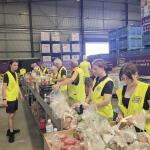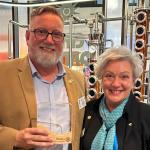A new way of Rotary
The traditional model of Rotary, with weekly meetings at a local venue, may not suit the lifestyle of many, especially people developing their careers or caring for young children. But that doesn’t mean they miss out on the joy of Rotary!
IN 2019, a group of committed young Rotary alumni decided it was time to explore a new model of Rotary. It would focus less on meetings and more on connecting people, ideas, passion and skills to create the change they want to see in the world.
The club’s unique structure adds value in this changing world, allowing those with varying work or study schedules or locations, carer responsibilities, mobility or transport issues access to Rotary.
Chartered in 2020, the Rotary Club of Social Impact Network (RSIN) is an innovative Rotary club based in District 9685 (NSW, Australia).
It is specifically designed for busy, impact-oriented people worldwide, who want flexible and inclusive ways to engage with Rotary, with low-commitment pathways to meaningful service and personal development.
The foundation of the club is a personalised membership model that recognises the contributions members are already making within their communities and to the Rotary world at large, with many members holding leadership roles on district, zone and international committees and fellowships.
“RSIN is my base for, not my source of Rotary,” said charter member and past RSIN secretary Michelle Westlund.
For over a century, Rotary has united people from diverse cultures and regions to create sustainable change.
“As global challenges become more interconnected and communities more diverse, Rotary adapts – not by simply expanding its reach, but by re-inventing how people engage across borders, cultures and generations.
“We knew only around five per cent of Rotaractors were joining Rotary and only five per cent of Rotarians are under the age of 40.”
The new model is working – in 2024-25 the club had a net increase of six members. It boasts a global membership, focused on youth program alumni who want to keep changing the world, existing Rotarians whose circumstances make traditional club models hard to maintain, and social impact professionals who use their careers for good, wherever they are based.
Members engage with their local Rotary and Rotaract clubs for local, in-person service and connection opportunities, such as tree planting, rubbish clean-ups and lending expertise to specific projects. This also enables members to undertake Rotary training and collaboration locally. The club’s current president lives in the Netherlands and attended President-elect training with the district she grew up in, in Germany, earlier this year, combining it with a family visit.
Anything requiring in-person participation is specifically designed to be location-agnostic, with members and friends able to undertake the same activity wherever in the world they might be, at a time that suits them.”
Initiatives of the club tackle issues like literacy, environmental protection and community health – often with a cross-border lens. Anything requiring in-person participation is specifically designed to be location-agnostic, with members and friends able to undertake the same activity wherever in the world they might be, at a time that suits them.
In a digital, mobile and multicultural world, RSIN models how Rotary can unite people for good, no matter where they’re from or where they live.
For more information visit rotarysocialimpact.org
Related news
Breaking Barriers
Para-athlete Lily Piccolo joins Rotary Dapto, championing inclusion and inspiring change across District 9675.
Measuring our impact
A new District 9685 Impact Report uncovers the real difference Rotary makes – far beyond projects and events.
Turning the tide on membership decline
Belmont Rotary reverses decline with a six-step plan, boosting membership and strengthening community engagement.
Join our newsletter for the latest updates
"*" indicates required fields


